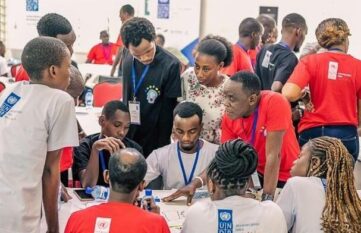© Windows / unsplash
Programmers in Kenya develop software for German technology companies, graphic designers in Rwanda edit images for Italian fashion companies and IT specialists in India answer technical questions for American users. Globalisation and the digitalisation of the world of work are changing the labour market. Companies are outsourcing their services to other countries, thereby not only promoting local economic growth, but also offering legal protection and fair wages for workers. But will the business process outsourcing (BPO) model continue to grow in the future, or will Artificial Intelligence (AI) replace the labour of employees?
For Africa, the continent I know best, the wages paid by BPOs are already decent. On a continent where over 80 percent of workers are in the informal economy [1], formal BPO employment provides many benefits and legal protections. Global BPOs are aware of the cost of a negative public image. Being labelled an exploitative sweatshop is not feasible. Unlike integrations into other global value chains, where working conditions are opaque [2] the salaries and working conditions in global BPOs are transparent to anyone willing to check [3]. Under these circumstances, the best way to spur the rise of good jobs is for BPO workers to continue to add value to the services they provide in ways that make them sought-after in global markets.
For this to become a reality, two questions need to be answered: (i) can digital services exports ignite the growth in productivity and innovation we know from manufacturing exports? And (ii) can this export-led growth model be sustained in an era where artificial intelligence (AI) could replace humans in BPO work? If the answer to both is ‘yes,’ then I am confident that the number of jobs and their wages in Africa’s BPO industry will continue to rise.
The rise of digital services exports
Manufacturing exports have long been seen as the fastest driver of catch-up development [4,5,6]. Since manufacturing exports are slowing [7] and seem to be clustered in Asia [8]], observers have been wondering whether the vehicle for Africa’s catch-up development can be services [9,10,11], especially exports of digital services [12,13]. While trade in manufacturing as a value of global GDP has steadily declined between 2016 and 2021, services exports from developing countries grew by 59 percent [14].
In Africa, Egypt, South Africa, and Morocco are the established BPO locations. But when Covid-19 lockdowns forced BPOs to diversify geographically [15], new delivery locations across Africa became interesting [16,17,18]. Kenya, for example, quickly doubled its number of BPO agents when two global BPOs – CCI and Teleperformance – came to Nairobi. Both plan on growing their Kenyan workforces tenfold, and other BPOs are following [19].
Enter Artificial Intelligence
On 30 November 2022 and 14 March 2023, OpenAI dumbfounded the world by releasing ChatGPT and GPT-4 [20]. Pundits prophesied the end of human BPO agents [21], but such claims had existed long before [22]. The question is whether generative AI is labour replacing or labour enhancing in the BPO sector. Past technological advancements were ‘skill-biased’ [23,24,25], reducing demand for mid-level jobs while boosting the productivity of high-level jobs, increasing societal inequalities [26,27,28]. If generative AI were now a continuation of that trend, this would imply that BPOs should stick to their established locations in India and The Philippines, where large pools of experienced agents exist. And if AI is about to decimate the BPO workforce, it makes little sense to invest in new delivery locations.
AI as Africa’s Window of Opportunity?
Global efforts exist to predict how many jobs will be ‘impacted’ (aided or diminished) by generative AI [29], ranging from 56 percent [30] to 23 percent [31], and all concur that digital services constitute the frontlines of these changes. Surprising anecdotal evidence suggests that AI reverses the skill bias and thus holds the greatest promise for the world’s poorest [32]. Most rigorous studies (using randomized controlled trials) confirm this new phenomenon. While one study of 640 Kenyan entrepreneurs produced the old familiar pattern: more experienced entrepreneurs benefited significantly from using AI while their least experienced peers did not [33], four other studies unveiled a new ‘catch-up’ dynamic. Among 758 BCG consultants [34] and 5,179 customer support agents in a Filipino BPO [35], the same trend-bucking finding emerged: when collaborating with ChatGPT, the least experienced (less productive) consultants and BPO workers gained the most. Jr BCG consultants became 43 percent more productive and junior BPO workers 34 percent. Their higher-skilled peers also improved with AI, but much less so.
Experiments on writers [36] and coders [37] confirm these new dynamics, which suggests that AI is reversing the decades-long trend of skill-biased technology that has widened the chasm between the best and the rest. This bodes well for the prospects of Africa’s digital services exporters. If AI helps younger, less experienced service providers catch up more quickly, then global BPOs are well advised to open new delivery locations in this young, cost-competitive continent. By creating decent employment opportunities, this directly impacts poverty reduction, which makes investing BPOs eligible for partnerships with targeted development assistance programmes [38,39,40,41,42].

Elvis Melia is a PhD researcher at the Univesity of Duisburg-Essen, a Member of the Institute for Development and Peace, and an Associate of the German Institute of Development and Sustainability in Bonn. His research interests lie in artificial intelligence and the future of work, especially in digital services exports from East Africa. He researches the location preferences of global business process outsourcing firms and the plight of online freelance workers in Kenya, Rwanda, and Ethiopia.




